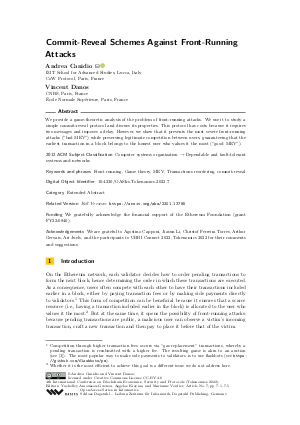OASIcs.Tokenomics.2022.7.pdf
- Filesize: 482 kB
- 5 pages

 Creative Commons Attribution 4.0 International license
Creative Commons Attribution 4.0 International license

We provide a game-theoretic analysis of the problem of front-running attacks. We use it to study a simple commit-reveal protocol and discuss its properties. This protocol has costs because it requires two messages and imposes a delay. However, we show that it prevents the most severe front-running attacks ("bad MEV") while preserving legitimate competition between users, guaranteeing that the earliest transaction in a block belongs to the honest user who values it the most ("good MEV").



Feedback for Dagstuhl Publishing